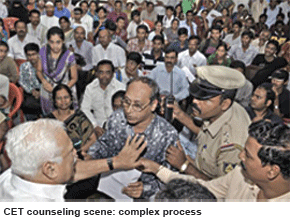The world over the process of admission into colleges and universities is simple. Students complete admission forms, provide required documentation, submit to interview and/or entrance exams, agree to pay prescribed fees and are admitted or rejected by college/university managements. But under Indian-style socialism distinguished by disrespect for property rights and driven by government need to subsidise the vocal middle class, admission into higher education institutions — especially professional education institutes — has become a complex and confusing process defined by quotas, differential tuition fees, reservation for special interest groups and over-regulation.
In particular, the government-prescribed admission process of Karnataka’s 250 professional colleges is becoming more chaotic and confusing year on year. This year hasn’t been any different. Through the months of May and June students suffered great anxiety with no clarity on the number of seats which would be made available to students topping the state government’s common entrance test (CET) by 187 private professional colleges, or of tuition fees payable. Under a seat-sharing agreement (which is renewed annually) between the state government and the Consortium of Medical, Engineering and Dental Colleges-Karnataka (COMED-K), private professional colleges surrender 25-45 percent of seats to CET toppers who pay rock-bottom tuition fees. On May 24 this seat-sharing agreement was renewed again by t he newly elected Congress state government and COMED-K. As per the agreement, in the new academic year commencing this month, 45 percent of first year seats in private unaided engineering colleges, 40 percent in medical and 25 percent in dental colleges, will be allotted to CET exam toppers.
 On July 2, the state government’s Karnataka Examinations Authority (KEA), which conducts CET and streams toppers into private professional colleges, announced that 46,600 engineering, 1,780 medical and 791 dental seats had been allocated for CET students (in order of their merit rank in the exam) at government-prescribed annual fees — engineering (Rs.41,390); medical (Rs.46,000) and dental (Rs.35,000) — and set the first round of face-to-face student admission coun-seling for July 10.
On July 2, the state government’s Karnataka Examinations Authority (KEA), which conducts CET and streams toppers into private professional colleges, announced that 46,600 engineering, 1,780 medical and 791 dental seats had been allocated for CET students (in order of their merit rank in the exam) at government-prescribed annual fees — engineering (Rs.41,390); medical (Rs.46,000) and dental (Rs.35,000) — and set the first round of face-to-face student admission coun-seling for July 10.
Meanwhile COMED-K had begun its admission counseling on July 2 (COMED-K conducts its own entrance test and counseling for admission into the remaining 55 percent engineering, 60 percent medical and 75 percent dental seats available in its 187 member colleges). Given that the fees under the government quota i.e. CET students, are much lower (COMED-K tuition fees range from Rs.1.25 lakh (engineering) to (Rs. 3.52 lakh (medical) per year), most students prefer to be admitted under the CET quota. Hence the disquiet over COMED-K beginning its admission process before KEA.
The state government’s extraction of a sizeable quota and insistence on stipulating the special tuition fees payable by government (CET) quota students to private professional coll-eges is questionable, given that three Supreme Court judgements (T.M.A. Pai Foundation (2002), Islamic Academy (2003) and P.A. Inamdar vs State of Maharashtra (2005)) have upheld the right of unaided professional education institutes to conduct their own “trans-parent” merit-based admission processes and levy “reasonable” tuition fees. More recently on July 18, the Supreme Court quashed the single-window National Eligibility-cum-Entrance Test (NEET) proposed by the Central government for admission into all medical colleges — government and private — countrywide. Thus the apex court again upheld the right of private colleges to frame their own admission processes.
“The state government has become too used to grabbing seats in private colleges for middle class students — who can well afford to pay. For those who cannot afford to pay our fees, it should work out a subsidised loan scheme. It’s time the government understood that quality education comes at a price. But I don’t believe the government will give up easily as subsidised professional education is crucial to preserving the middle class vote bank,” says the promoter of a private professional college who preferred to remain anonymous.
But according to Dr. G.K. Karanth, professor of sociology at the Institute for Social and Economic Change, Bangalore, politics in India is strongly driven by welfare considerations and “reasonable regulation” of private professional colleges by the State is needed to guarantee social justice. “The State has a moral obligation in an unequal and ethnically divided society to look after the disadvantaged and guarantee social justice. This requires regulation of private professional colleges to ensure equitable education opportunities for all. Moreover, all private professional colleges were licenced to also attain social justice objectives. Hence there’s nothing wrong in the government mandating a quota for meritorious and needy students who top CET,’’ says Karanth.
Quite obviously, within the collective national mindset the practice of the State passing on the burden of educating “poor students” to private unaided professional colleges is too deeply entrenched for any radical policy shift to happen. As we go to press, newspaper reports are abuzz that the KEA, in its second round of CET admission counseling, has compo-unded the confusion with numerous errors in matching students with colleges. With the state government proposing more regulation through the imposition of the Karnataka Educational Institutions (Regulation of Admission and Determination of Fees) Act, 2006 and fees fixation committee next year, the confusion witnessed this year will be multiplied.
Summiya Yasmeen (Bangalore)